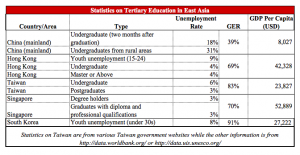As we begin to delve deeper into higher education in East Asian countries, our group would like to present some data on an economic aspect that is closely related to higher education, but isn’t always discussed in relation with it: Unemployment among the educated. We came across an interesting article (http://theconversation.com/massive-expansion-of-universities-in-asia-raises-tough-questions-on-social-mobility-54680) which talks about the high growth rate of higher education enrollments in East Asia and the statistics on lack of employment opportunities for those with college degrees. Following is a comparison of statistics from China, Hong Kong, Taiwan, Singapore and South Korea in the year 2014. China seems to be an outlier with the highest unemployment rates among recent graduates. The article raises an important question that has been discussed in many forms in our class: What is the point of more higher education when an economy cannot gainfully absorb all the graduates? And what are the consequences if these conditions persist over a long period of time?
Note: The unemployment statistics from the article have not been checked by us. We are assuming that the usual definition of unemployment applies here: The percentage of people in a group (such as undergraduates or graduates) that are looking for employment and are not yet employed.

Great question, Soumya, but I think the problem is not that the economy cannot “gainfully absorb” graduates, there are job openings across all levels and all sectors. In a booming economy such as China, I think this is especially true in the tech sectors (with the expansion of companies such as Alibaba).
I agree with Sofia that there is a mismatch, but I think the mismatch lies between employers’ expectation and graduates’ current skill level. However, I think the kind of jobs that are on the market, colleges may not prepare students well enough for, either because the curriculum has not caught up with the knowledge required to perform these new jobs, which may not existed 5 or 10 years ago. Thus, more higher education is necessary to fill these new jobs and boost the economy, but the current design of higher education needs to be adjusted to be more in line with the fast-changing demands of the economy.
Great post, thanks for the data.
It is always necessary, when analyzing higher education in a country, to also see the country’s economy needs. If what the economy need is not concordant with the students degrees or graduates aspirations, a country can achieve high levels of unemployment. Even though China is improving their service and innovation sector, the expansion of these sectors is not going as fast as the increase in higher education, therefore they aren’t able to employ all the lawyers, doctors, accountants, scientist or managers that each year graduate from University. China is now confronting a period were the more educated you are, the harder it is to find your dream job. They are facing a job mismatch and they need to do something about it.